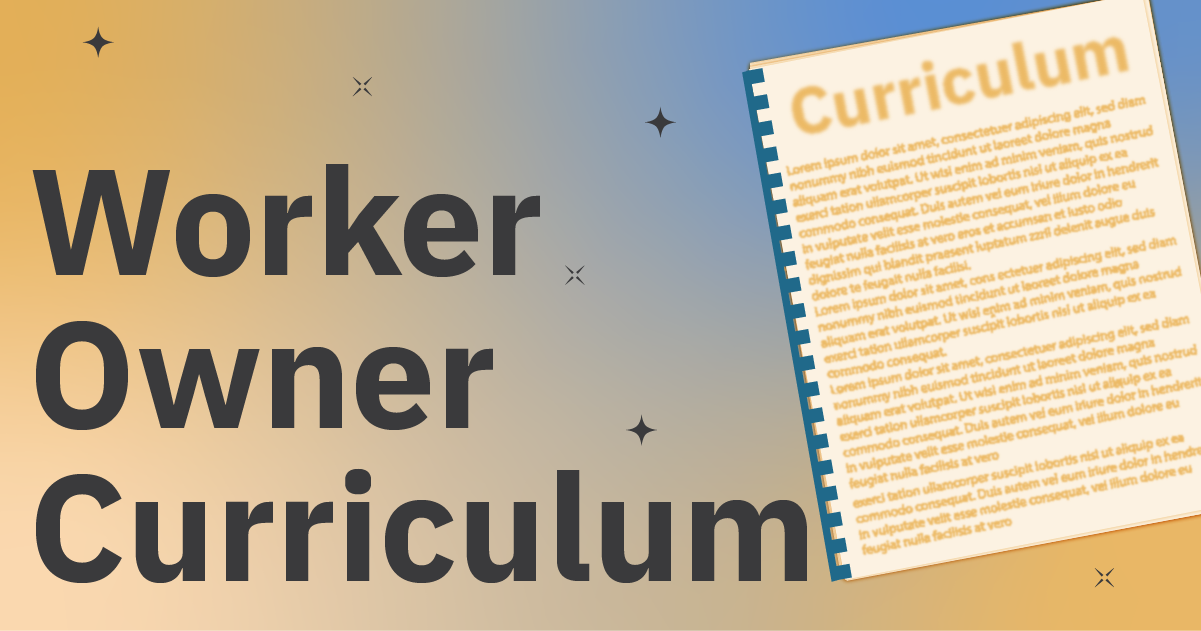
The worker ownership group prepared a 6-part curriculum to help prepare worker owner candidates for participating in ownership of D3. It’s one part of our three-stage candidacy program, which you can read more about in detail here.
Through the curriculum process, different owners took responsibility for creating different aspects of the curriculum and one owner acted as a consistent guide. The candidates also filled out surveys at the end of each month’s section to help us iterate and improve the curriculum for future candidates. The guide from the ownership group reviewed these survey responses in a group session with the candidates.
Our curriculum is designed to provide insight into the ownership structure as well as continuing to reinforce values of D3’s work culture like collaboration and cooperation. To start, everyone develops their own worker profile. Each profile includes Meyers Briggs personality types, Gallup StrengthsFinder strengths, and learning styles assessments. After reviewing existing owners’ profiles, candidates create their own. These styles are aggregated together into a “team profile.” The whole team can look at these and we can start to see trends, strengths, and opportunities on the team. For example, when we aggregated all the teams’ StrengthsFinder results, we found that many team members have a variety of strategic thinking, relationship building, and executing strengths, but only a few team members have influencing strengths. This can impact our future hiring decisions, but more importantly helps us be considerate of people’s different perspectives. It changes how we think about challenges when we work together because we are able to look at how the learning styles of a team member might be different from our own and adjust accordingly.
The second section introduces the idea of worker ownership and how it connects to D3’s values. This includes sharing the current owners’ perspectives on why they joined the ownership group. It also includes reviewing the operating agreement in detail and a summary of the agreement to start getting used to the ownership structure and language used when the ownership team meets. We also discuss the International Cooperative Alliance’s cooperative definitions.
On the practical side of things, the ownership curriculum covers the company’s finances in the third section. Early on in the worker-owner conversion process, we integrated a monthly finance review into our general team meeting so D3’s financial performance is transparent even to non-owners. This section dives into the terminology a little bit more, reviews our budgeting process and financial history in more detail, and ensures every candidate understands the basics of D3’s accounting system.
The fourth section focuses on logistics of ownership. It helps candidates understand the delineation between an “owner hat” and an “employee hat.” This distinction is important as the day-to-day operations of D3 are managed by the Co-Executive Directors, who are also owners. There are limitations as to what role owners have in the day-to-day management of the organization and we want to make sure roles are defined clearly.
One way the ownership group strives to preserve a cooperative spirit is decision making through consent, or sociocracy which is covered in the fifth section. Sociocracy is a concept of shared decision making where each owner is given an opportunity to weigh in on a topic, proposals are made, and each owner consents to or amends a specific proposal until everyone has consented. The main aspect of this is that consent does not mean “this is the decision I would make on my own” but more specifically that in the context of a shared ownership structure, this is the best decision for D3 at this time. Learning and implementing sociocracy was one of the biggest challenges current owners mentioned in their individual reflections and so we spend some time elaborating on it.
The final section of the curriculum revisits the operating agreement in greater detail. It shows candidates where some of the most important topics are explained such as obligations of worker owners, the process of the candidacy program, benefits of worker ownership, and the legal/financial implications that ownership may have on a candidate’s personal life.
Currently we have 4 candidates who have recently completed the curriculum program. In the near future, the ownership group will vote on inviting them to become probationary members, which allows them to attend ownership meetings and be included in the process of ownership so that they can better understand the ownership structure and make the most informed decision about joining the ownership team if they’re invited. Once their journey has finished, we hope to share some of their insights on becoming owners in 2024!
Read all of the posts in our series Worker Ownership
